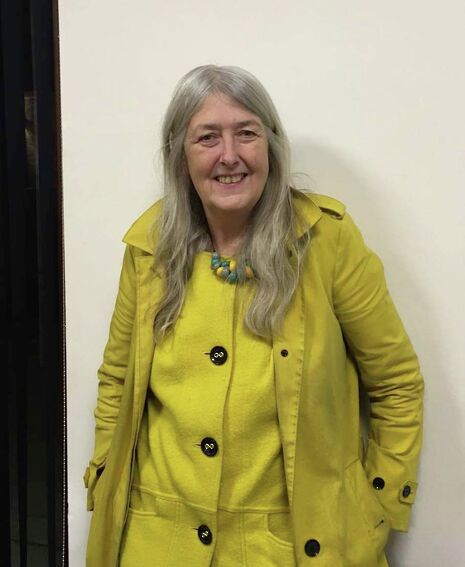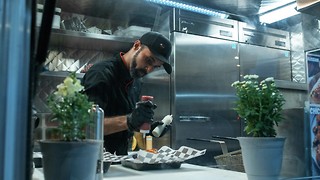Mary Beard: ‘This was a man’s university for 750 years’
Theo Demolder speaks to the academic, household name, and national treasure about life in this ancient institution

“Kind of a competitive martyrdom”, Mary Beard tells me (quoting a colleague), is what being an academic is like. “You’re always fighting the sense that you’re really not very good. Although a lot of academics look as if they’re super self-confident, I think deep down, in bed at night, they still worry they’re no good.”
However, it is clear that Professor Beard loves her job. “If you’re at Cambridge, you’re damned lucky with the students… you get kept alive actually; I can think of nothing worse than having a full time research job.” For Beard, it is having “a very good argument” which makes a good supervision. “To put it from a very selfish point of view, I have learnt how to argue and my intellectual course has often been changed by supervisions. Your students are likely to be more honest than your colleagues and say ‘I don’t see why that adds up.’ But conversely you occasionally see that you’ve made a difference to the way someone thinks about something. I remember many years ago we had just finished a supervision – everyone had gone out… I was probably about to have a gin and tonic – and this guy came back round the door and said ‘can I just say, I’ve never thought about it like that before?’ He was probably very embarrassed to say it, but I thought ‘You’ve made my bloody day!’”
I was keen to get her view on the prospects of women following her into academia, and she was optimistic. “This was a man’s University for 750 years, and it’s come a long way in the last 50 – but you don’t change seven and a half centuries completely in half a century. For all its efforts, Cambridge is still a very oddly gendered place – but it would be far too crude to say it’s simply misogynistic – it isn’t that.” And she is confident that women’s colleges still have an important place. “If I hadn’t thought we needed them I’d have done a runner! Particularly when I was the only woman in the Classics faculty, I could go back to my college for lunch and complain about how I had forgotten the kids’ ballet shoes or something like that in a way that would be understood… you were with people who knew what you were talking about – trying to live split lives; it always seems to me that it’s overwhelmingly the women who come to work with domestic responsibility still in their heads. Maybe they’re just better at pretending, but observing my male colleagues, I don’t think they sit down at lunch and think ‘Oh shit! Who’s got the ballet shoes?’”
From the buttery to the BBC, she sees her rise to fame as “a whole series of interlocking coincidences”, but largely credits her subject matter – the Romans themselves. I asked her about why she thought that was; why, for instance, archaeologists had chosen to dub a new discovery in Cambridgeshire the British – “Pompeii!” she exclaimed. “I know! I think that’s really interesting, isn’t it? I think there hasn’t been a moment in my consciousness where Rome hasn’t been a big part of a fairly wide popular culture. There’s something about the Romans that speaks to us about being us. And obviously in Europe that’s aided by knowing that the political geography of your country is Roman. Why is London the capital? – because the Romans made it the sodding capital!”
Despite assuring me that “anybody who does telly has to know that if you’re very popular now, there will come a time when they don’t want you”, she has two new programmes on the horizon – a one-off documentary about Pompeii to be broadcast in March, and a series on the Roman Empire which she describes as “quite hard core” – to be broadcast in four parts. “It’s asking: who’s actually running the Empire? Who’s the guy on the door? Who’s the guy from Spain who’s bringing the olives to Rome? So it’s kind of a mixture of the slightly blokeish big historical questions and the nitty gritty.”
Concerned that our 15 minute interview slot was nearing half an hour, I pointed out that we had gone over time. “It doesn’t matter,” she replied, “we’re enjoying it!” and resumed a trail of thought flitting from Robert Harris’s Cicero trilogy to her dislike of soundbites such as ‘long term economic plan.’ It struck me that to outward appearances at least, she is someone who is always enjoying it. It is her authentic enthusiasm for discussing her work which has turned a Classics professor at Newnham into a household name. If she is one of those academics who goes to bed worried, she really needn’t be.
 News / Students form new left-wing society in criticism of CULC3 September 2025
News / Students form new left-wing society in criticism of CULC3 September 2025 News / Tompkins Table 2025: Trinity widens gap on Christ’s19 August 2025
News / Tompkins Table 2025: Trinity widens gap on Christ’s19 August 2025 News / Cambridge’s tallest building restored to former glory1 September 2025
News / Cambridge’s tallest building restored to former glory1 September 2025 News / Student house could become homeless shelter2 September 2025
News / Student house could become homeless shelter2 September 2025 News / Robinson historian calls to recognise first King of England4 September 2025
News / Robinson historian calls to recognise first King of England4 September 2025








